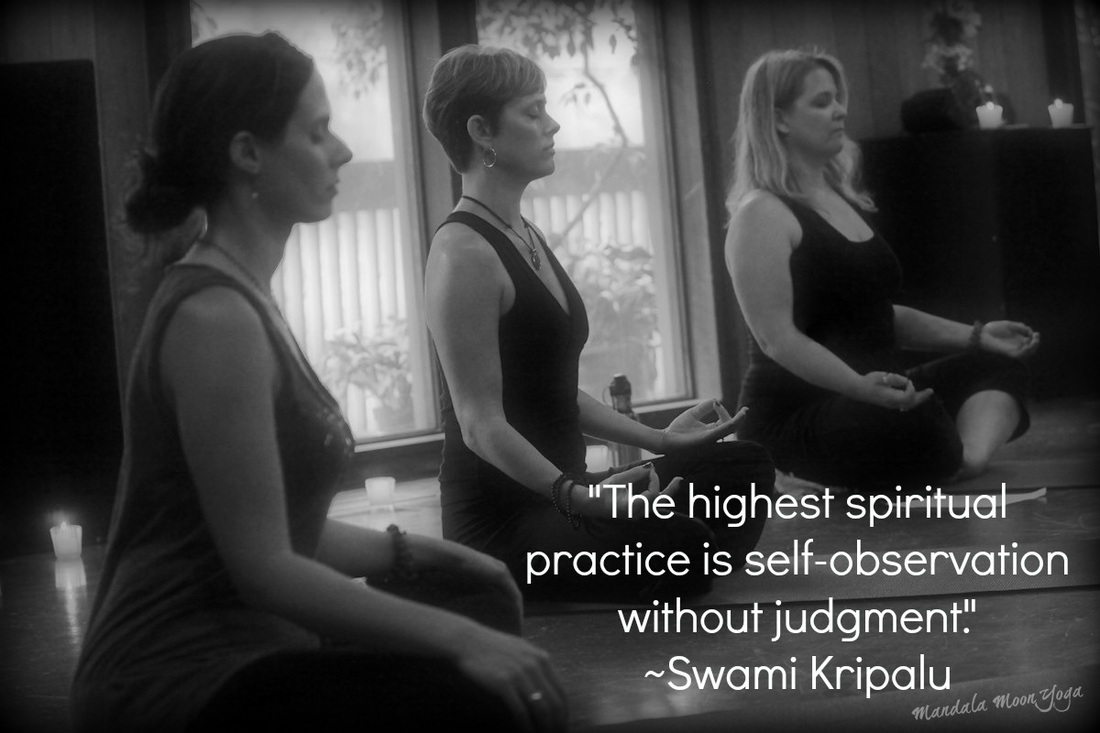Svadhyaya is self-study and the fourth of five Niyamas, the personal ethics or observances listed in Patanjali’s Yoga Sutras. Svadhyaya is not always fun to practice, but it is always fun to say.
Imagine this. You’re in the dressing room of a department store under those awful fluorescent lights. You have selected a teeny-tiny bikini (or Speedo if you are of the male persuasion). Once you have it on, you look into a three-way mirror. You study yourself. You cannot help but notice every perceived flaw on your body. You can see the results of your penchant for late snacking or beer or sweets or bacon or [insert your vice here]. Look again. You see the places where your age and gravity are evident or the battle scars from surgeries, disease, or childbirth. Or, perhaps you are diligent of diet and dedicated to a regular exercise and moisturizing routine, so you admire your toned muscles, your curves and skin. Perhaps a bit of both. You enjoy the “good” and make weird faces at the “bad.”
What can you learn from this study of your physical body? Are there areas you don’t want to see? Areas you avoid? Maybe it wouldn’t hurt to replace one cup of coffee each day with a glass of water. What about your best features? How do you feel when you gaze at your attributes? And what does it all mean? Are you ashamed, proud, judgmental, content? What else? When you take the time to reflect on your thoughts about this experience, this is self-study of your mind. You may realize you’re hard on yourself or easy on yourself. You may realize that you’re hard or easy on everyone else too!
Did you ever hear a recording of your voice or see yourself on video and think, “That’s not what I sound/look like?”
Now, imagine you could hold up a mirror that showed the emotional or mental or spiritual reflection of your habits. Svadhyaya is about paying attention to your own behaviors, thoughts and actions. And then thinking about them. There are many mirrors available. Your yoga practice is a wonderful mirror. Are you critical of your asanas (poses)? Proud? Do you peek at others in the class or secretly hope they are looking at you? Are you able to sink into the stillness of a surrendering pose or do you dread the quiet time with only yourself for company? Do you push yourself to the point of injury? Are you habitually the first one to arrive to class? Or the last? Do you need to have the best yoga mat and apparel? Why? Do you always practice at the same spot in the room? To all of these questions, why? What might it reveal about you and your engrained habits?
Books are mirrors. Traditionally, the study of spiritual scriptures was considered the key to learning about the self. Religious rituals and practices from all traditions are mirrors. Relationships are mirrors. Running, biking, dancing, singing, meditating? All mirrors. Whatever you’re doing, are you doing it mindfully? Or out of habit? Think of the person you most admire. Would he or she be proud of you?
The bottom line? Pay attention. Notice your behaviors. Adjust according to your core values. Repeat.




 RSS Feed
RSS Feed